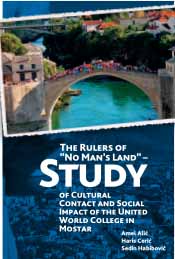The Rulers of “No Man’s Land” – Study of Cultural Contact and Social Impact of the United World College in Mostar
The Rulers of “No Man’s Land” – Study of Cultural Contact and Social Impact of the United World College in Mostar
Author(s): Amel Alić, Haris Cerić, Sedin Habibović
Subject(s): Anthropology, Social Sciences, Education, Sociology, Culture and social structure , School education, Social differentiation, Sociology of Culture, Sociology of the arts, business, education, Sociology of Education, Identity of Collectives
Published by: Dobra knjiga
Keywords: intercultural education; culturally sensitive pedagogy; acculturation; socialization; social distance;
Summary/Abstract: In Bosnia and Herzegovina, research publications of this kind are rare, that is why this study, particularly its quality, extensiveness and omprehensiveness in analyzing the observed problem, does not only fill the void in the field of scientific studies, but was published both in the local and in English language, thus attracting the attention of researchers in this field to the methodology, instruments and key findings of this study and perhaps inspire them to conduct similar researches. The authors have managed to explore and prove that UWC Mostar, compared to other schools, manages to develop intercultural education, practice the environment culturally sensitive pedagogy, offer students best education that will prepare them for their studies and enrich them with life skills and finally, help them navigate in new cultures with people of different cultural experiences and traditions. The study describes exceptional voluntarism of the school community, which is a generally underdeveloped and unknown concept in local communities and school curricula. This is an exceptionally valuable study, as it presents findings that describe UWC Mostar’s unique role and engagement as a multicultural educational institution in a city that, despite all the positive elements recognized by individuals and institutions, still mostly fails to get to know UWC Mostar better, accept its real values and provide for an environment where these values could be applied to local schools and institutions working with young people and enable UWC Mostar achieve a wider and more complete community impact.
- Print-ISBN-13: 978-9958-27-432-9
- Page Count: 160
- Publication Year: 2018
- Language: English
- eBook-PDF
- Sample-PDF
- Table of Content
- Introduction

